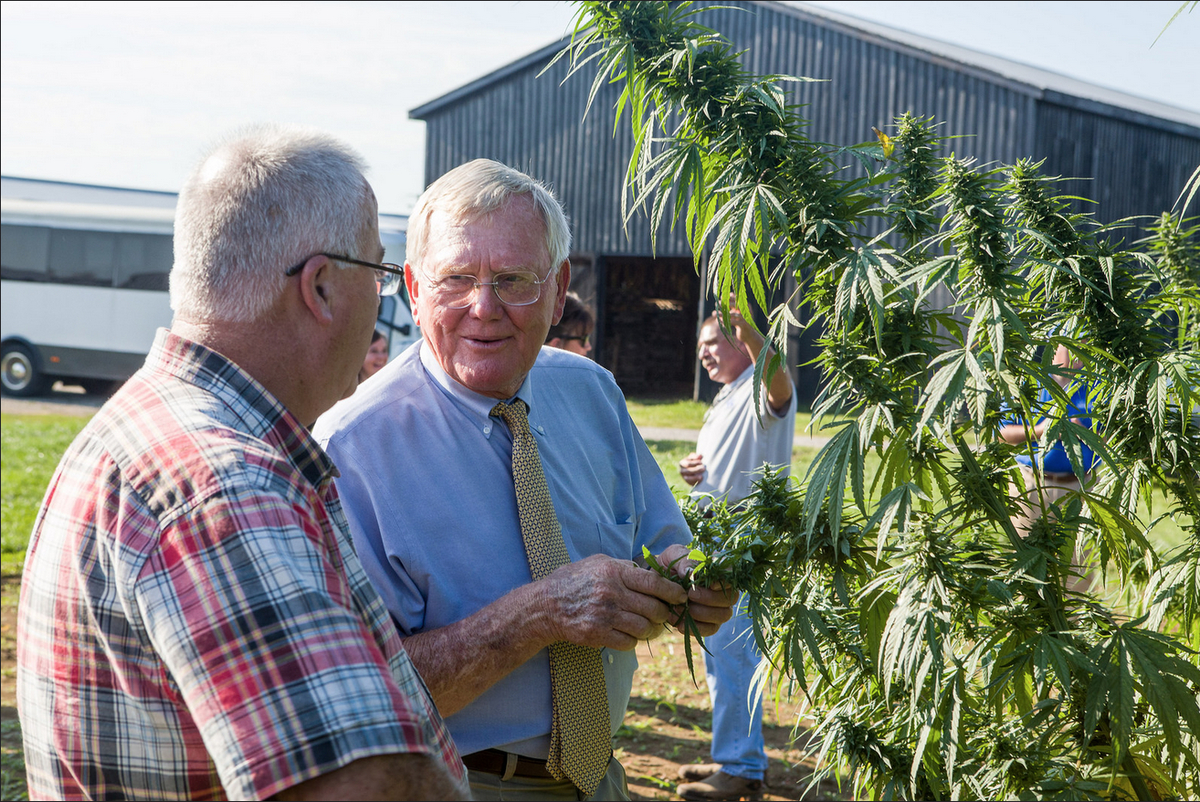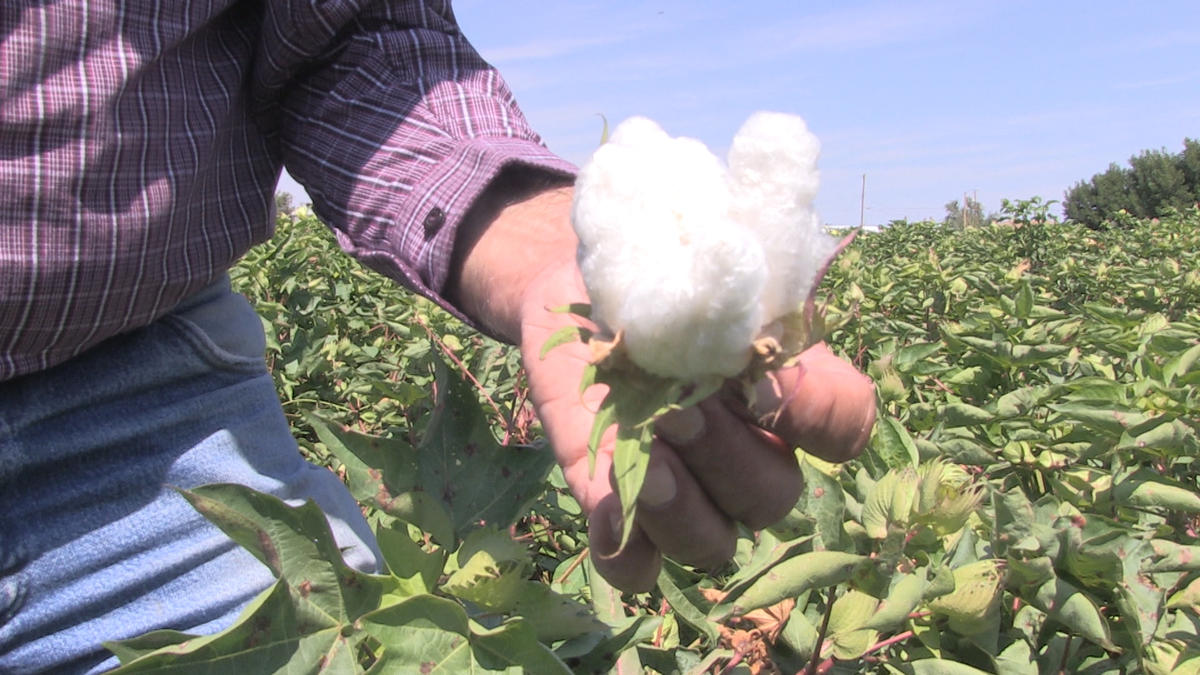Source: krwg.org

University of Kentucky researchers are already studying the commercial viability of hemp.
There are as many as 25,000 uses for hemp: Super foods, clothing and cosmetics--According to industry studies. Hemp retail products generate as much as $500 million dollars in the US every year. For New Mexico the low water use crop is a chance to maximize profit from scarce water supplies. But hemp’s ill-founded association with marijuana may have derailed New Mexico farmers’ hopes of capitalizing on the emerging hemp market.
Ramon Alvarez worked alongside his father on the family's farm in La Union New Mexico during the brutal drought of the 1950’s and 1960’s.
So when Alvarez he took over 20 years later he was looking for ways to stabilize the farms revenue and get the most out of the farms limited water supplies.
So he took a chance growing organic cotton. He now supplies high end European and Japanese fashion labels at a premium.
“So we are using the same water; both conventional and organic. But conventional cotton might bring one and a half times the conventional price.” Alvarez said.
Alvarez also grows organic alfalfa and hay.
But Alvarez has his eye on another high profit agricultural product: Hemp.
According to the North American Industrial Hemp council. Hemp has over 25,000 productive uses; as a super food, clothing fiber and bio fuel.
In the US the total retail value of hemp products sold in 2012 was estimated to be $500 million dollars. But a lot of those profits aren’t being made in the US because hemp products have to be imported; it is illegal for US farmers to grow it.
But that wasn’t always the case. According to an Indiana University study US founding fathers like Washington and Jefferson grew hemp. Jefferson even drafting the declaration of independence was drafted on hemp paper.
But in 1937 hemp was banned in the wake of hysteria over the dangers associated with its hallucinogenic cousin marijuana.
Hysteria illustrated American anti-drug film of the time “Reefer Madness”. The film called Marijuana “the burning weed with its roots in hell” and catalyst for “Debauchery violence, murder, suicide.”
Hemp could still be grown in certain circumstances; During World War II the government actually encouraged people to grow hemp as a way to support the allies’ campaign.
Some historians say the crackdown on hemp along with marijuana was the result of political pressure from the cotton and oil industries- that were rivaled by the versatility of the plant’s productive uses.
Recognizing that versatility in 2014 the U.S. House passed an amendment to the farm bill allowing agricultural departments and universities to research the commercial viability of hemp.
Alvarez said hemp could be a good option for Mesilla valley farmers. Not only does it take about half the water needed to grow cotton but it also stands up to salty irrigation water.
“I have quit growing chile. The salt content in the soil has gone up since we started pumping” Alvarez said.
Bi-national agricultural comparisons aren’t perfect; but in Canada, growing hemp is legal. So here’s how it breaks down.
According to the USDA in 2013 New Mexico cotton yielded a $180.00 dollar per acre profit excluding government subsidies.
While Hemp yielded a $430.00 per acre profit for Canadian farmers, according to Canadian agricultural data.
New Mexico District 33 State Representative Bill McCamley co-sponsored a hemp research and development bill. He said hemp’s economic potential garnered the bill bipartisan support in the legislature.
“Allowing for plants with legitimate economic benefits to be grown that use water in an efficient manner is simply good public policy.” McCamley said.
“Allowing for plants with legitimate economic benefits to be grown that use water in an efficient manner is simply good public policy.” McCamley said.
So why isn’t New Mexico State University researching the viability of hemp for farmers like Alvarez?
Governor Susana Martinez vetoed it. She said it was not in line with the federal farm bill. In a statement she said.
"Senate Bill 94 poses a number of problems as a result of the contradictions it would create between state and federal law. As just one example, federal law classifies tetrahydrocannabinol
as a controlled substance where hemp products designed for human ingestion are concerned. Senate Bill 94 does not recognize this distinction. This and other conflicts between state and federal law would unnecessarily complicate the task of law enforcement and the state Department of Agriculture of regulating the production of hemp."
as a controlled substance where hemp products designed for human ingestion are concerned. Senate Bill 94 does not recognize this distinction. This and other conflicts between state and federal law would unnecessarily complicate the task of law enforcement and the state Department of Agriculture of regulating the production of hemp."
Before it was put up for a vote Bonnie Rabe with the New Mexico Department of Agriculture was brought in to review the legislation to ensure it lined up with the farm bill. She said there was no such conflict.
“There wasn’t anything I am aware of that was out of line with that. Like I said we worked hard to get it within the parameters of that.” Rabe said.
McCamley said the association between hemp and marijuana combined with the Governors national political aspirations might have had something to do with her decision to veto.
“I think that has got to be part of it. That is one of the biggest problems we had a lot of older people look at this as the same thing. It is hard for me right because I am the guy that is actually sponsoring the pro legalization bill of marijuana with high THC. Lets be real clear with what the difference is, hemp doesn’t have THC in it.” McCamley said.
McCamley said while New Mexico law falls short of federal allowances for research development other states like Kentucky and Colorado are going past federal law and beginning commercial production.
“We are losing ground to other states that are moving ahead with this research processes’ McCamley said “When the federal government changes their mind, which will probably happen sooner rather than later we are going to be behind the eight ball.”
Back on the farm in La Union Alvarez is getting ready to drill a new water well, twice as deep as the one it is replacing. Alvarez said more needs to be done to incentivize farmers to move away from high water use crops like cotton.
“I know us farmers are a dying breed. I have a son and hope he continues in the farming tradition. I am a third generation farmer and I would love for him to continue. But I know things are tough.” Alvarez said.
McCamley said he will be pushing the hemp industrial research bill in the 2017 legislative session. 20 states have passed laws allowing industrial, agricultural or academic hemp research programs.



No comments:
Post a Comment